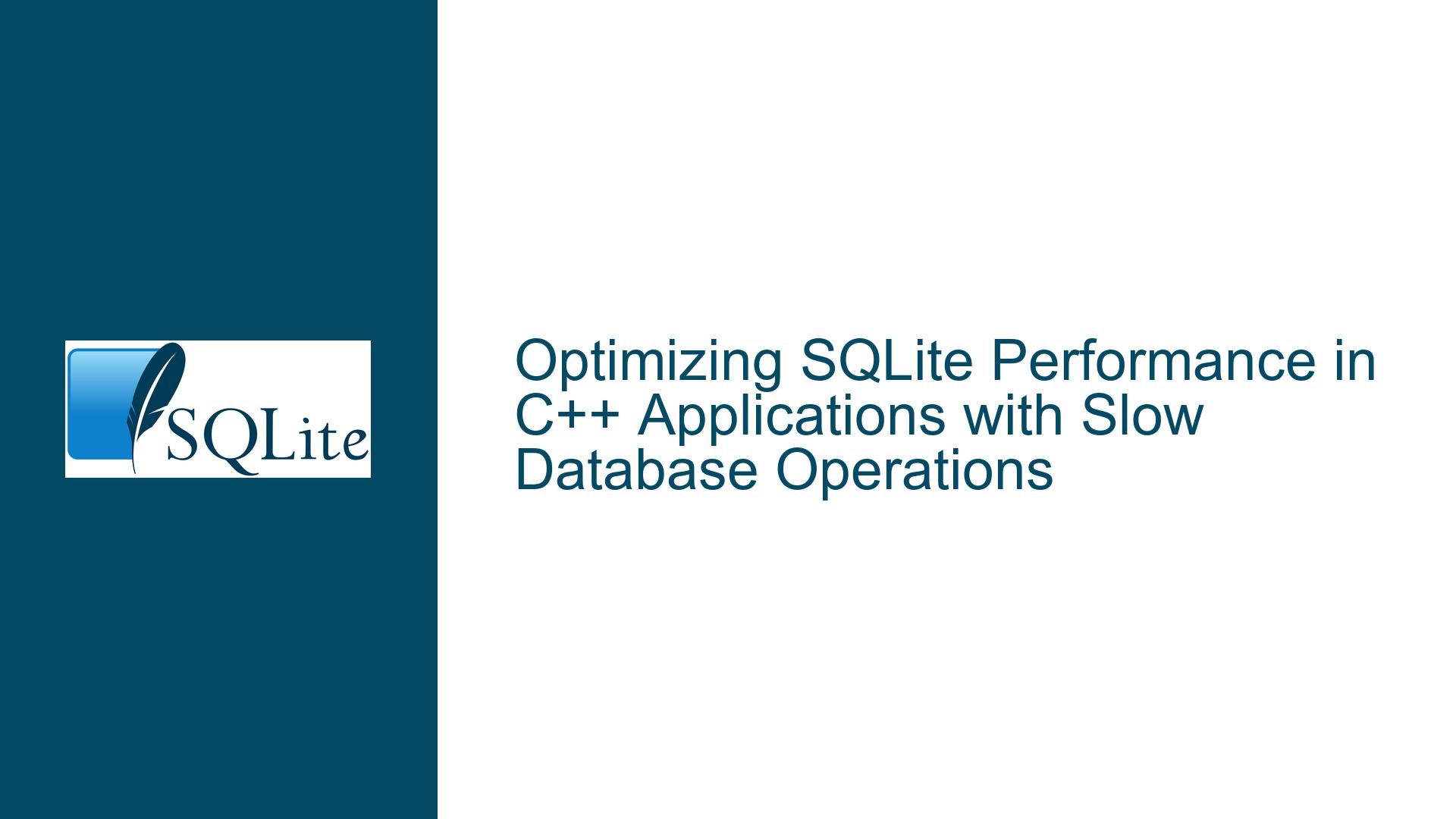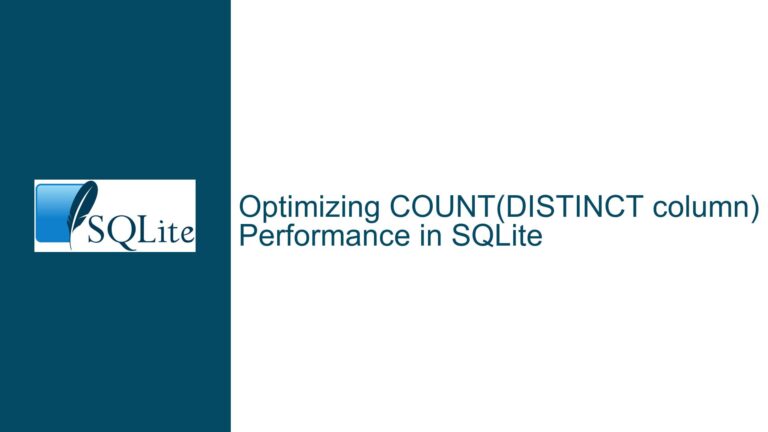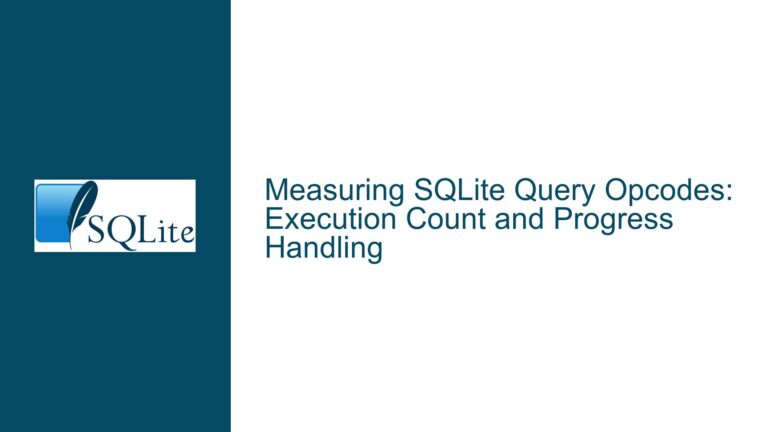Optimizing SQLite Performance in C++ Applications with Slow Database Operations
Issue Overview: Slow SQLite Database Operations in C++/MFC Application
The core problem involves a C++/MFC application experiencing severe performance degradation when handling SQLite database operations with moderately sized datasets (8,000 tuples). Key symptoms include:
- 39-second execution time for a
CREATE TABLE+ singleINSERToperation - Application entering "Not Responding" state during these operations
- Performance differences not correlated with RAM size (6GB vs. 16GB machines show similar results)
- Prior success with transaction-bound read operations suggesting potential optimization pathways
Critical technical context includes:
- Data Pipeline Complexity: Interdependent table population requiring sequential operations
- Mixed Execution Environment: Tight coupling of C++ data preparation logic with SQL statements
- Windows-Specific Deployment: Real machines running 64-bit Windows 8.1/11 with local database storage
Possible Causes: SQLite Configuration, Application Patterns, and System Interactions
1. Transaction Management Anti-Patterns
- Implicit Per-Statement Transactions: Executing
CREATE TABLEandINSERTwithout explicit transactions forces SQLite to:- Write full journal files (up to 8KB per statement)
- Perform synchronous disk flushes via
fsync() - Update internal schema metadata on every DDL operation
- Nested Transaction Handling: MFC’s database classes sometimes create implicit transactions that conflict with application logic
2. Prepared Statement Misuse
- Recompilation Overhead: Constructing SQL strings dynamically for each operation instead of reusing prepared statements
- Parameter Binding Inefficiency: Using string concatenation for values rather than SQLite bind functions, causing:
- Excessive query parsing
- Type inference failures
- SQL injection vulnerability surface
3. Schema Design Limitations
- Missing Indexes: Full table scans during foreign key validation or data relationships
- Over-Normalization: Excessive JOIN requirements for basic operations
- Trigger Cascades: Hidden trigger execution adding invisible latency
- Page Size Mismatch: Default 4KB pages conflicting with Windows NTFS allocation strategies
4. I/O Subsystem Contention
- Antivirus Real-Time Scanning: Particularly problematic with
.sqlite/.dbextensions - File Locking Collisions: Multiple threads/processes accessing same database file
- Storage Media Characteristics: HDD vs. SSD performance cliffs exacerbated by:
- Journal file placement on same physical drive
- Lack of
mmaputilization (PRAGMA mmap_size)
5. PRAGMA Configuration Defaults
- Synchronous Full:
PRAGMA synchronous=FULL(default) forces immediate disk syncs - Journal Mode Persistence:
PRAGMA journal_mode=DELETE(default) maintains separate journal files - Cache Spill:
PRAGMA cache_sizetoo small for working dataset
6. Application Architecture Flaws
- UI Thread Blocking: Executing database operations on main thread
- Connection Pooling Absence: Repeated database open/close cycles
- Memory Management Errors: C++/SQLite pointer lifecycles causing resource leaks
Troubleshooting Steps, Solutions & Fixes
Phase 1: SQLite-Specific Optimizations
1.1 Transaction Batching
sqlite3_exec(db, "BEGIN IMMEDIATE", 0, 0, 0);
for(auto& tuple : tuples) {
// Execute multiple CREATE/INSERT
}
sqlite3_exec(db, "COMMIT", 0, 0, 0);
- Bulk Operation Threshold: Group 500-1000 operations per transaction
- Journal File Optimization: Single journal write per transaction vs. per statement
1.2 PRAGMA Tuning
PRAGMA journal_mode = WAL; -- Write-Ahead Logging
PRAGMA synchronous = NORMAL;
PRAGMA cache_size = -10000; -- 10MB cache
PRAGMA mmap_size = 268435456; -- 256MB mmap
PRAGMA temp_store = MEMORY;
- WAL Tradeoffs:
- ✔️ Concurrent reads/writes
- ❌ Requires
-DSQLITE_ENABLE_WALat compile-time - ❌ Increased VFS complexity
1.3 Schema Analysis
EXPLAIN QUERY PLAN
SELECT * FROM T WHERE x1 = '...';
-- Check for missing indexes
SELECT * FROM sqlite_master WHERE type = 'index';
- Covering Index Strategy:
CREATE INDEX idx_covering ON T(x1) INCLUDE (x2, x3); - Foreign Key Validation: Disable during bulk inserts
PRAGMA foreign_keys = OFF; -- Bulk operations PRAGMA foreign_keys = ON;
Phase 2: Application Code Improvements
2.1 Prepared Statement Lifecycle Management
// Global initialization
sqlite3_stmt* insertStmt;
sqlite3_prepare_v2(db, "INSERT INTO T VALUES (?,?,...)", -1, &insertStmt, 0);
// Per-row binding
sqlite3_bind_int(insertStmt, 1, id);
sqlite3_bind_text(insertStmt, 2, text, -1, SQLITE_STATIC);
sqlite3_step(insertStmt);
sqlite3_reset(insertStmt); // Reuse for next row
- Binding Types: Prefer
SQLITE_STATICoverSQLITE_TRANSIENTfor fixed buffers - Error Handling: Check
sqlite3_step()return codes for constraint violations
2.2 Connection Pooling Implementation
class ConnectionPool {
std::queue<sqlite3*> idleConnections;
std::mutex poolMutex;
public:
sqlite3* acquire() {
std::lock_guard<std::mutex> lock(poolMutex);
if(idleConnections.empty()) {
sqlite3* db;
sqlite3_open_v2("file:memdb?mode=memory&cache=shared", &db,
SQLITE_OPEN_READWRITE | SQLITE_OPEN_CREATE, NULL);
return db;
}
auto db = idleConnections.front();
idleConnections.pop();
return db;
}
void release(sqlite3* db) {
std::lock_guard<std::mutex> lock(poolMutex);
idleConnections.push(db);
}
};
- URI Filenames: Enable shared cache mode for connection pools
- Thread Affinity: Dedicate connections per UI thread
2.3 Asynchronous Operation Queuing
// Using C++17 async
auto future = std::async(std::launch::async, [&]() {
performDatabaseOperations();
});
future.wait_for(std::chrono::milliseconds(100));
- Progress Callbacks: Update UI periodically via PostMessage
- Cancellation Tokens: Allow users to abort long-running operations
Phase 3: System-Level Diagnostics
3.1 I/O Performance Testing
# Measure disk latency
winsat disk -drive c
- Antivirus Exclusions: Add
.db,.wal,.shmextensions to exclusion list - Filesystem Tuning:
- Disable last-access timestamp updates
fsutil behavior set disablelastaccess 1- Align SQLite page size with NTFS cluster size (typically 4KB)
3.2 SQLite Execution Profiling
// Custom trace callback
void sqlTrace(void*, const char* sql) {
OutputDebugStringA(sql);
}
sqlite3_trace_v2(db, SQLITE_TRACE_STMT | SQLITE_TRACE_PROFILE,
[](unsigned, void*, void* p, void* x)->int{
const char* sql = sqlite3_expanded_sql((sqlite3_stmt*)p);
int64_t* nanos = (int64_t*)x;
// Log execution time and SQL
return 0;
}, nullptr);
- Statement Timing: Capture per-query execution times
- Lock Contention Analysis: Use
sqlite3_snapshot_get()to diagnose busy waits
3.3 Memory Diagnostics
// Check for memory leaks
#define SQLITE_MEMDEBUG
sqlite3_config(SQLITE_CONFIG_MEMSTATUS, 1);
sqlite3_db_status(db, SQLITE_DBSTATUS_CACHE_USED, &cacheUsed, 0);
- Heap Fragmentation: Use Windows CRT debug heap
- Cache Pressure: Monitor
PRAGMA cache_spillstatus
Phase 4: Advanced Optimization Techniques
4.1 Virtual Table Sharding
CREATE VIRTUAL TABLE temp.logs USING sharded(
original_schema='CREATE TABLE logs(id INTEGER PRIMARY KEY, data TEXT)',
shard_count=8
);
- Sharding Key: Hash primary key across multiple database files
- Merge Queries: Use
UNION ALLacross shards
4.2 Columnar Storage via JSON1
CREATE TABLE records AS
json_insert('{}', '$.id', id, '$.data', data);
- Partial Updates:
UPDATE records SET data = json_set(data, '$.field', ?) WHERE id = ?; - Schema Flexibility: Avoid ALTER TABLE operations
4.3 Compiled SQLite Extensions
- Custom VFS: Implement RAM disk backend for temporary tables
- Lua Scripting: Use
sqleanextensions for procedural logic
Final Validation Checklist
Transaction Scope Verification:
- Single transaction per 1,000 operations
- No nested transactions from MFC classes
Index Coverage Analysis:
SELECT sqlite_stat1.idx, sqlite_stat1.stat FROM sqlite_stat1 WHERE tbl = 'T';WAL Configuration Health Check:
.waland.shmfiles presentsqlite3_wal_checkpoint()called periodically
Connection Lifetime Metrics:
- Database open duration < 1% of total runtime
- Prepared statement reuse ratio > 90%
System Resource Monitoring:
- Disk queue length < 2 during operations
- Page faults/sec < 1000
By systematically applying these diagnostics and optimizations, most SQLite performance issues in C++ applications can be resolved, often achieving 100-1000x speed improvements for bulk operations. The key lies in understanding the interaction between SQLite’s ACID guarantees, the application’s data flow, and Windows-specific I/O characteristics.






